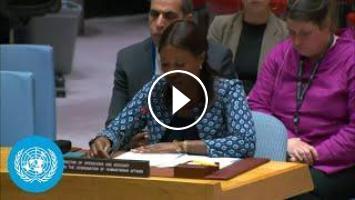Briefing by Edem Wosornu, Director of Operations and Advocacy, Office for the Coordination of Humanitarian Affairs, on the situation in the Middle East, during the Security Council, 9654th meeting.
In her briefing to the Council, the Director of Operations and Advocacy at the Office for the Coordination of Humanitarian Affairs (OCHA) Edem Wosornu said these developments in the banking system, “have potentially catastrophic ramifications.”
Wosornu said, “they threatened to further fragment and weaken Yemen's already struggling economy. They undermine the private sectors ability to conduct their functions and financial transactions necessary for the import of food and other essential goods, further limiting the availability of basic commodities and of course driving up prices. And above all, they are disrupting the flow of remittances, on which so many families in Yemen depend.”
All these factors, she said, “will likely deepen poverty, worsen food insecurity and malnutrition and increase reliance on humanitarian assistance.”
Yemeni Ambassador Abdullah Ali Fadhel Al-Saadi, in his briefing to the Council said, “we reaffirm the fact that the Presidential Leadership Council and the Yemeni Government have fully taken into account the decisions in the Yemeni bank to protect the Yemeni banking system to end the monetary distortions and to counter inflation, as well as to respect the principle of good governance and to improve the oversight of banks as well as the foreign bank transactions, as well as respecting the issues is related to the trade transactions with to counter money laundering and the financing of terrorism.”
Before the meeting, the United Kingdom’s Ambassador Barbara Woodward, flanked by a group of ambassadors demanded “the immediate and unconditional release of all those detained” and urged the Houthis “to ensure the safety and security of humanitarian and United Nations personnel.”
For his part, Al-Saadi said, “the Yemeni Government has repeatedly warned of the danger of turning a blind eyes to Houthis violations, criminal practices, blackmail methods and persecution of humanitarian organizations to serve their political agenda, harness humanitarian aid to serve their security and military agenda, especially at a time when more than 18 million are in dire need humanitarian assistance.”
In her briefing to the Council, the Director of Operations and Advocacy at the Office for the Coordination of Humanitarian Affairs (OCHA) Edem Wosornu said these developments in the banking system, “have potentially catastrophic ramifications.”
Wosornu said, “they threatened to further fragment and weaken Yemen's already struggling economy. They undermine the private sectors ability to conduct their functions and financial transactions necessary for the import of food and other essential goods, further limiting the availability of basic commodities and of course driving up prices. And above all, they are disrupting the flow of remittances, on which so many families in Yemen depend.”
All these factors, she said, “will likely deepen poverty, worsen food insecurity and malnutrition and increase reliance on humanitarian assistance.”
Yemeni Ambassador Abdullah Ali Fadhel Al-Saadi, in his briefing to the Council said, “we reaffirm the fact that the Presidential Leadership Council and the Yemeni Government have fully taken into account the decisions in the Yemeni bank to protect the Yemeni banking system to end the monetary distortions and to counter inflation, as well as to respect the principle of good governance and to improve the oversight of banks as well as the foreign bank transactions, as well as respecting the issues is related to the trade transactions with to counter money laundering and the financing of terrorism.”
Before the meeting, the United Kingdom’s Ambassador Barbara Woodward, flanked by a group of ambassadors demanded “the immediate and unconditional release of all those detained” and urged the Houthis “to ensure the safety and security of humanitarian and United Nations personnel.”
For his part, Al-Saadi said, “the Yemeni Government has repeatedly warned of the danger of turning a blind eyes to Houthis violations, criminal practices, blackmail methods and persecution of humanitarian organizations to serve their political agenda, harness humanitarian aid to serve their security and military agenda, especially at a time when more than 18 million are in dire need humanitarian assistance.”
- Category
- United Nations
- Tags
- UN, United Nations, UNGA
Be the first to comment













